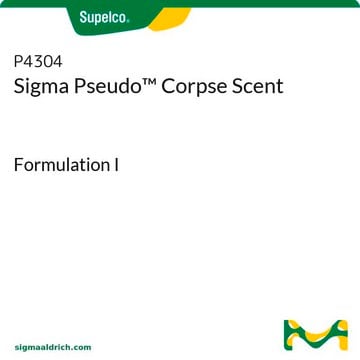D5941
Drabkin′s reagent
for the determination of hemoglobin
Synonym(s):
Hemoglobin Quantitation Reagent
Sign Into View Organizational & Contract Pricing
All Photos(1)
About This Item
UNSPSC Code:
12352402
NACRES:
NA.25
Recommended Products
Quality Level
form
liquid
General description
Drabkin′s reagent is used in measuring haemoglobin from blood samples. It comprises potassium ferricyanide, potassium cyanide and potassium dihydrogen phosphate as components. Potassium ferricyanide oxidizes haemoglobin to methemoglobin and then to cyanmethemoglobin. The cyanmethemoglobin levels is estimated at 530nm. It is a reliable method and can measure all haemoglobin forms except sulphaemoglobin.
Application
Drabkin′s reagent has been used for the quantitative colorimetric determination of blood haemoglobin in cerebral tissue to assess cerebral haemorrhage, in red blood cells to detect hemolysis and in contralateral and ipsilateral brain tissue homogenate.
Components
Contains sodium bicarbonate, potassium ferricyanide, and potassium cyanide.
related product
Signal Word
Danger
Hazard Statements
Precautionary Statements
Hazard Classifications
Acute Tox. 2 Oral - Acute Tox. 4 Dermal - Acute Tox. 4 Inhalation - Aquatic Acute 1 - Aquatic Chronic 2 - Eye Irrit. 2 - STOT RE 2
Target Organs
Thyroid
Supplementary Hazards
Storage Class Code
6.1A - Combustible acute toxic Cat. 1 and 2 / very toxic hazardous materials
WGK
WGK 3
Flash Point(F)
Not applicable
Flash Point(C)
Not applicable
Personal Protective Equipment
dust mask type N95 (US), Eyeshields, Gloves
Certificates of Analysis (COA)
Search for Certificates of Analysis (COA) by entering the products Lot/Batch Number. Lot and Batch Numbers can be found on a product’s label following the words ‘Lot’ or ‘Batch’.
Already Own This Product?
Find documentation for the products that you have recently purchased in the Document Library.
Customers Also Viewed
Comparative study of hemoglobin estimated by Drabkin's and Sahli's methods.
Balasubramaniam P and Malathi A
Journal of Postgraduate Medicine, 38(1), 8-8 (1992)
Toxic effects of silver nanoparticles and nanowires on erythrocyte rheology
Kim MJ and Shin S
Food And Chemical Toxicology, 67(6), 80-86 (2014)
Kang Nian Yap et al.
The Journal of experimental biology, 220(Pt 22), 4282-4291 (2017-09-28)
Foraging to obtain food, either for self-maintenance or at presumably elevated rates to provide for offspring, is thought to be an energetically demanding activity but one that is essential for fitness (higher reproductive success and survival). Nevertheless, the physiological mechanisms
Non-invasive multimodality imaging directly shows TRPM4 inhibition ameliorates stroke reperfusion injury
Chen B, et al.
Translational Stroke Research, 1-13 (2018)
Comparative measuring between fresh and stored Drabkin's reagent preparations on hemoglobin estimation
Madani N, et al.
Sudan Medical Monitor, 10(1), 7-7 (2015)
Our team of scientists has experience in all areas of research including Life Science, Material Science, Chemical Synthesis, Chromatography, Analytical and many others.
Contact Technical Service















